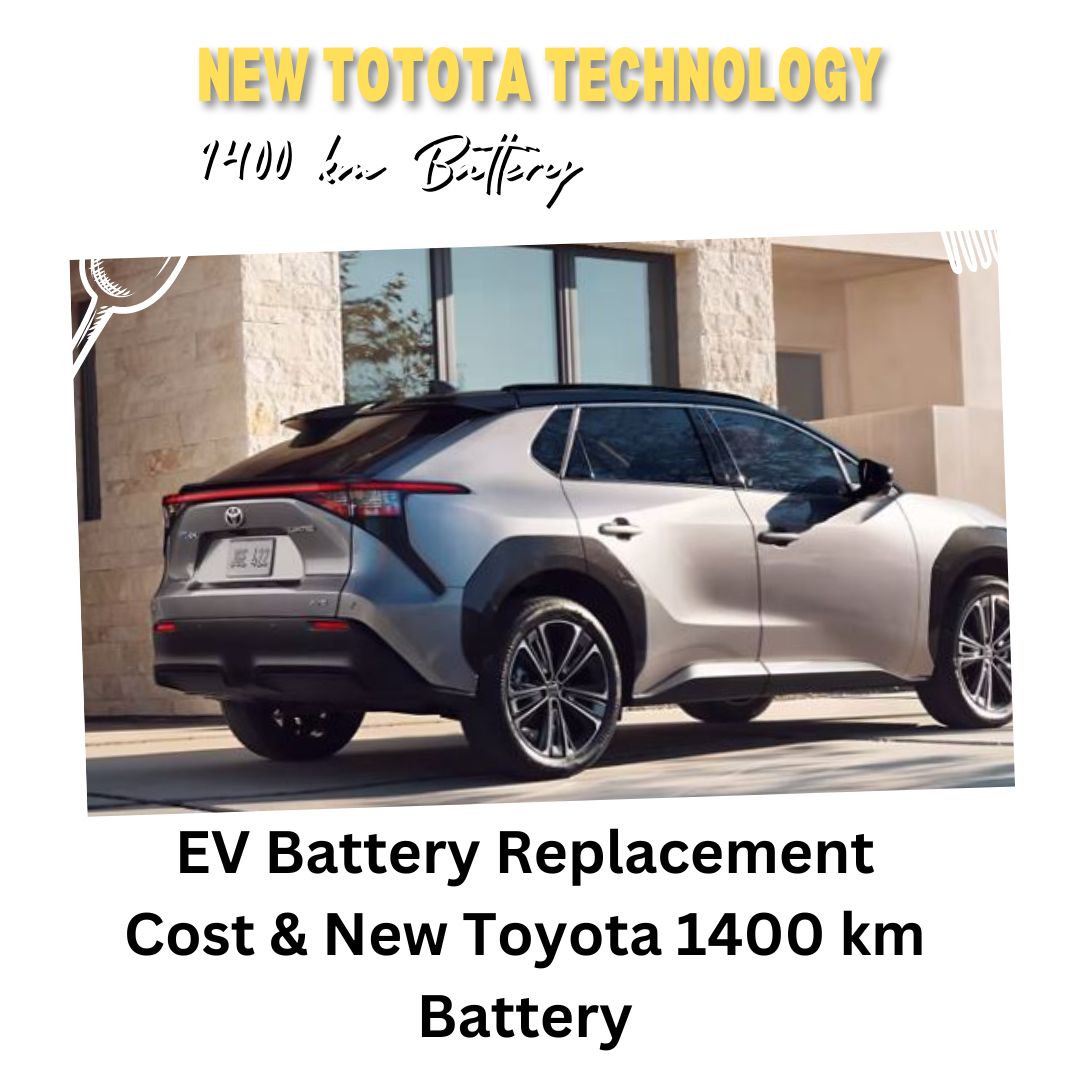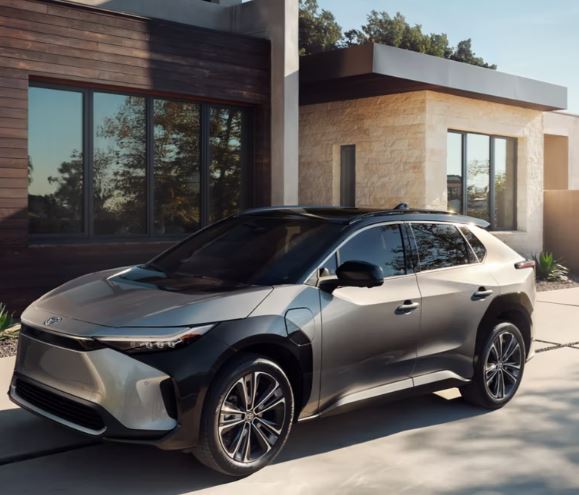
EV Battery Replacement Cost & New Toyota 1400 km Battery
EV Battery Replacement Cost & New Toyota 1400 km Battery.
EV Battery Replacement Cost
When purchasing an electric vehicle (EV), there are several factors to consider. These include identifying the best models, determining sufficient range, understanding charging processes, and taking maintenance costs into account. Compared to traditional gasoline-powered cars, EVs generally require less maintenance due to the absence of oil changes and reduced wear on brakes, as stated by the U.S. Department of Energy. However, the cost of replacing the EV battery can be significant.
Fortunately, EV batteries are designed to last for the expected lifespan of the vehicle, and federal regulations mandate that automakers provide a powertrain warranty that covers the battery. In this article, we will explore when a battery replacement might be necessary, the potential costs involved, and strategies to minimize the likelihood of requiring a battery pack replacement.
The battery is a crucial and expensive component of an electric vehicle (EV) that may require replacement. While there is a possibility of a complete battery failure due to a manufacturing defect, the more significant concern is battery degradation. Although most automakers claim that an EV battery can last up to 20 years, it is challenging to assess the extent of degradation since most EVs have only been in use for a few years.

According to a study conducted by battery analytics company Recurrent, the likelihood of an EV needing a battery replacement is relatively low. Out of 15,000 electric cars analyzed, only 1.5% required battery replacements, excluding those related to manufacturer recalls like the one issued by GM for the Chevrolet Bolt EV. Moreover, even if a battery replacement becomes necessary due to failure or degradation, new-car warranties typically cover the battery for a minimum of eight years or 100,000 miles, with many warranties also providing protection against capacity loss.
Damage resulting from an accident is another circumstance that may necessitate a new battery for an EV. Even a minor collision can cause scratches or other damage to the battery, leading to either replacement or a total loss of the vehicle, as reported by Reuters. The repairability of EV batteries can vary depending on the model. For example, the Tesla Model Y integrates its battery into the structure of the SUV, making it challenging or impossible to repair.
In cases where an electric vehicle (EV) is no longer covered by warranty or if its battery sustains damage not covered by insurance, the estimated out-of-pocket cost for a battery replacement varies from $5,000 to $20,000, according to Recurrent. The specific cost depends on factors such as the battery pack’s size, type, and manufacturer.
For instance, J.D. Power states that the cost of replacing the battery in a Tesla Model 3 is approximately $13,000, which accounts for more than 30% of the sedan’s initial price. When factoring in labor, Recurrent estimates the total replacement cost for the Model 3’s battery at around $15,800.
The positive news is that EV battery costs are projected to decline over time. The Department of Energy reports that the cost of lithium-ion batteries used in EVs dropped by 89%, falling from $1,355 per kilowatt-hour in 2008 to $153 per kWh in 2022. This significant reduction is attributed to advancements in battery technology and increased manufacturing volume.
Andrew Garberson, the head of marketing at Recurrent, advises against focusing on the average cost of an EV battery replacement since it varies greatly depending on the make and model. Instead, he recommends checking the remaining warranty details specific to a particular vehicle, which is included in each Recurrent Report. It is also important to consider the replacement rate and cost for the specific model. Garberson emphasizes that battery replacements are far less common than people generally assume.
EV Battery Replacement Cost – not the sole deciding factor when considering electric vehicles
While the cost of EV batteries should not be the sole deciding factor when considering electric vehicles, it is crucial to maintain the battery properly to extend its lifespan. To minimize battery degradation, it is recommended to limit the use of DC fast charging to when it is necessary, keep the battery charge level between 20% and 80%, and reduce exposure to high temperatures.
Now, let’s address the topic of used EVs. Older models of used EVs are more likely to require a new battery due to capacity loss, and these vehicles may not be covered under warranty. It is important for buyers to exercise caution if the EV’s warranty has expired or if the warranty is not transferred to them upon purchase. For instance, prior to the 2020 model year, Hyundai’s EV warranty was not transferable. As a result, replacing the battery in an older Ioniq or Kona EV would likely be an out-of-pocket expense. Before purchasing a used EV, it is advisable to verify the vehicle’s model year using a free VIN decoder and review the original warranty terms to determine if the battery is still covered.
Source: Cars.com
New Toyota 1400 km Battery
Toyota, the Japanese automaker, has announced a significant advancement in battery innovation for its electric vehicle (EV) division, which they consider a “technological breakthrough.” This comes at a time when the company has faced criticism for its reluctance to invest in green mobility, resulting in a decline in popularity among customers.
Keiji Kaita, the president of Toyota’s research and development center, stated on July 3 that their solid-state battery technology aims to revolutionize the current state of batteries, addressing issues such as size, weight, and cost. However, it is important to approach these claims with caution, especially in light of another statement made in June that their vehicles could achieve a range of nearly 1,500 kilometers on a battery charge of only 10 minutes or less.
Source: Quartz
Toyota has announced its plans to develop a next-generation electric vehicle (EV) battery with an impressive range of approximately 1,500 kilometers (932 miles). The Japanese automaker aims to bring this commercial solid-state battery to the market by 2027, boasting a remarkable charging time of just 10 minutes.
In a technology briefing, Toyota stated that the advanced battery will not only enhance the vehicle’s operating system but also enable customization of the driving experience, specifically focusing on aspects such as acceleration, turning, and stopping.
The company emphasized that recent advancements in battery technology have paved the way for transitioning from the research phase to the production of solid-state batteries. These batteries offer several advantages over the currently used lithium-ion batteries in commercial electric cars.
Despite the limitations in range and charging associated with lithium-ion batteries, they have been preferred over solid-state batteries due to cost and durability concerns. However, Toyota’s development signals a promising shift towards utilizing solid-state batteries in the future of electric vehicles.
Toyota announced a significant breakthrough in overcoming the challenges associated with battery technology, although they did not provide specific details about the breakthrough.
The company stated its commitment to advancing lithium-ion batteries, with plans to develop a more efficient battery capable of offering a range of 1,000 kilometers, nearly twice that of Tesla’s long-range Model Y.
Additionally, Toyota revealed its intention to develop lithium-iron phosphate (LFP) batteries as a more affordable alternative to both lithium-ion and solid-state batteries. The briefing also highlighted non-battery-related innovations, including aerodynamic technology inspired by rocket hypersonic aerodynamics and manufacturing upgrades aimed at reducing costs.
One notable manufacturing advancement mentioned is Giga casting, a production process originally pioneered by Tesla to streamline electric vehicle manufacturing. Toyota President Koji Sato has previously acknowledged the company’s need to catch up in the electric vehicle sector.
Following the announcement, Toyota’s share price experienced a notable increase, reaching its highest level since August of the previous year.
Source: Independant UK

Toyota’s poor EV record
While Toyota’s recent advances in battery technology are commendable, the company may face challenges in gaining public trust due to previous issues with its vehicles. For instance, on June 28, the UK’s Advertising Standards Authority banned Toyota’s and Hyundai’s advertisements for misleading consumers about the charging speed of their electric cars. Toyota claimed that its EVs could be charged to 80% in approximately 30 minutes using a 150kW fast-charging system. The company also failed to provide precise locations of its EV chargers, despite stating that it had 419 charging stations across the UK.
Moreover, in a study assessing automakers’ decarbonization efforts, Greenpeace ranked Toyota at the bottom among 10 manufacturers, citing slow progress in producing zero-emission vehicles. Greenpeace Australia also raised concerns in March, urging the country’s consumer watchdog to investigate whether Toyota’s environmental claims were misleading. Toyota rejected the allegations.
Additionally, Toyota has faced setbacks in the past, including issues with its pioneering electric SUV, the bZ4X. Shortly after its launch in April 2022, the company recalled 2,700 bZ4X units due to the potential risk of wheels detaching. The recall affected vehicles destined for Europe (2,200 units), the US (260 units), Japan (110 units), and Canada (20 units). Fortunately, most of the vehicles had not been delivered to customers at the time of the recall.
These incidents may create mixed feelings among potential customers regarding the efficiency and reliability of Toyota’s vehicles, despite the company’s recent battery advancements.
Additionally, in April 2022, Toyota issued a recall of 460,000 vehicles in the US due to a stability control issue. The recall aimed to address a software problem that unintentionally disabled the electronic stability control system in the affected vehicles. This recall impacted ten different Toyota car models.
Furthermore, on May 30, the company initiated another recall, this time involving specific 2022 and 2023 models of the Corolla Cross. Although these models are not electric vehicles, the recall still had a negative impact on Toyota’s reputation. In a statement, Toyota explained that a manufacturing error could result in the front passenger airbag not deploying as intended. Approximately 96,000 vehicles were recalled in the US alone. Consequently, these vehicles might not meet federal safety requirements and could pose increased injury risks in the event of a crash.
Source: Quartz
Battery Swapping Technology for EVs
What is Battery Subscription for Electric Vehicle (EV)?





